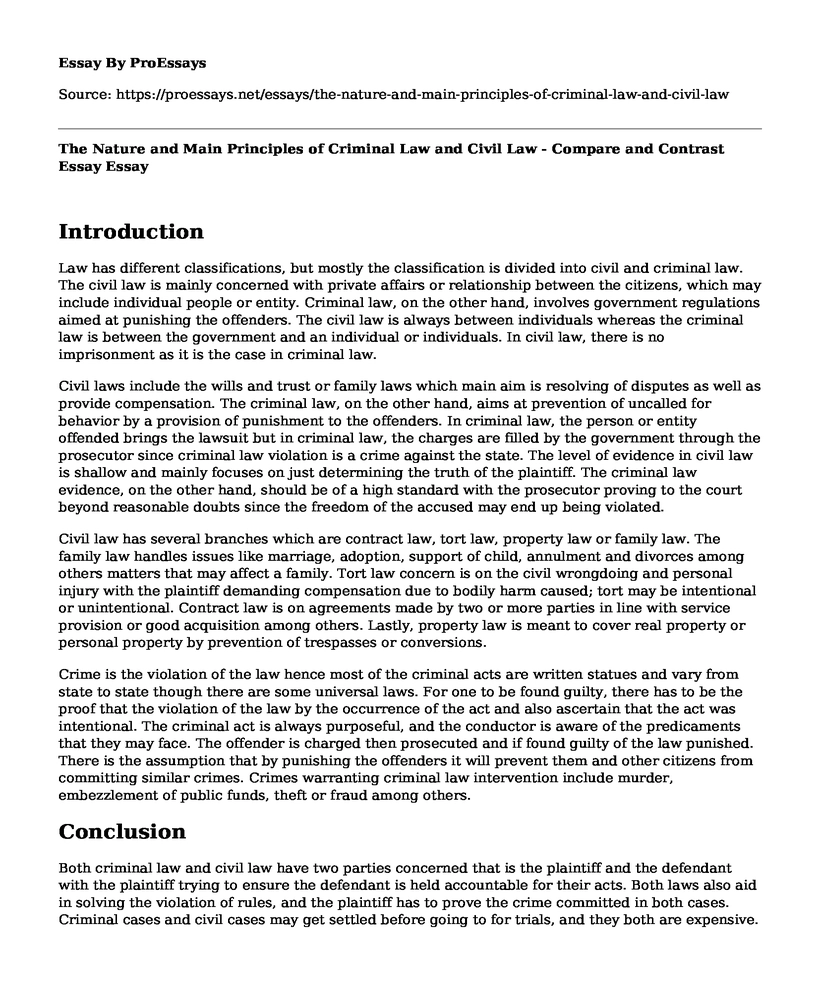Introduction
Law has different classifications, but mostly the classification is divided into civil and criminal law. The civil law is mainly concerned with private affairs or relationship between the citizens, which may include individual people or entity. Criminal law, on the other hand, involves government regulations aimed at punishing the offenders. The civil law is always between individuals whereas the criminal law is between the government and an individual or individuals. In civil law, there is no imprisonment as it is the case in criminal law.
Civil laws include the wills and trust or family laws which main aim is resolving of disputes as well as provide compensation. The criminal law, on the other hand, aims at prevention of uncalled for behavior by a provision of punishment to the offenders. In criminal law, the person or entity offended brings the lawsuit but in criminal law, the charges are filled by the government through the prosecutor since criminal law violation is a crime against the state. The level of evidence in civil law is shallow and mainly focuses on just determining the truth of the plaintiff. The criminal law evidence, on the other hand, should be of a high standard with the prosecutor proving to the court beyond reasonable doubts since the freedom of the accused may end up being violated.
Civil law has several branches which are contract law, tort law, property law or family law. The family law handles issues like marriage, adoption, support of child, annulment and divorces among others matters that may affect a family. Tort law concern is on the civil wrongdoing and personal injury with the plaintiff demanding compensation due to bodily harm caused; tort may be intentional or unintentional. Contract law is on agreements made by two or more parties in line with service provision or good acquisition among others. Lastly, property law is meant to cover real property or personal property by prevention of trespasses or conversions.
Crime is the violation of the law hence most of the criminal acts are written statues and vary from state to state though there are some universal laws. For one to be found guilty, there has to be the proof that the violation of the law by the occurrence of the act and also ascertain that the act was intentional. The criminal act is always purposeful, and the conductor is aware of the predicaments that they may face. The offender is charged then prosecuted and if found guilty of the law punished. There is the assumption that by punishing the offenders it will prevent them and other citizens from committing similar crimes. Crimes warranting criminal law intervention include murder, embezzlement of public funds, theft or fraud among others.
Conclusion
Both criminal law and civil law have two parties concerned that is the plaintiff and the defendant with the plaintiff trying to ensure the defendant is held accountable for their acts. Both laws also aid in solving the violation of rules, and the plaintiff has to prove the crime committed in both cases. Criminal cases and civil cases may get settled before going to for trials, and they both are expensive. Both laws are fought in court, although both civil and criminal law have the plaintiff, in civil law, a private lawyer represents the plaintiff but in, criminal law, the prosecutor represents the plaintiff.
Cite this page
The Nature and Main Principles of Criminal Law and Civil Law - Compare and Contrast Essay. (2022, Feb 11). Retrieved from https://proessays.net/essays/the-nature-and-main-principles-of-criminal-law-and-civil-law
If you are the original author of this essay and no longer wish to have it published on the ProEssays website, please click below to request its removal:
- Quantitative, Qualitative and Mixed Methods - Selecting a Research Approach
- Implications of the ANA's Position on Ethics - Essay Sample
- Plan Implementation and Neutralizing Opposition to Prevent the Crime Among the Juveniles Paper Example
- Does Technology Invade Our Privacy? Paper Example
- Essay Sample on IRS Scams and Tax Fraud
- Essay on Leadership in Criminal Justice: Attracting Subordinates and Improving Performance
- Legal Proceedings: Evidence, Ruling & Interpretation - Essay Sample







